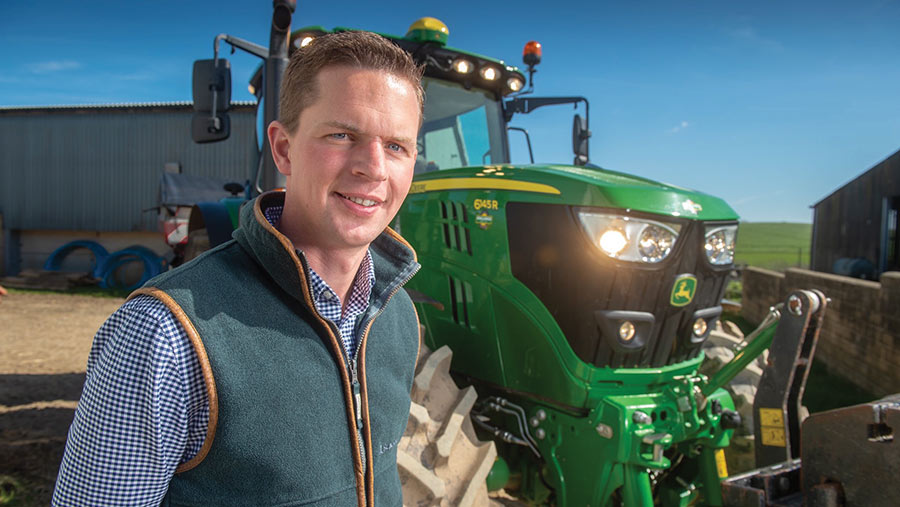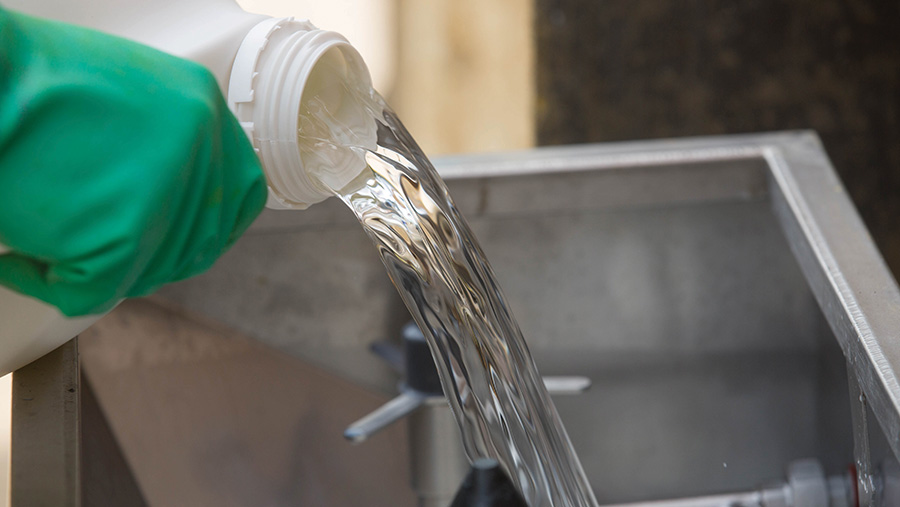How and why a farmer trained to do his own agronomy
 Ashley Jones © Paul Slater
Ashley Jones © Paul Slater Benchmarking against other farmers is a great way to identify cost savings and it was the starting point for Cornish farmer Ashley Jones’s journey to train as an agronomist.
Having previously used a local agronomy company for crop walking and providing recommendations at Smeaton Farm, Saltash, the turning point was when he joined the AHDB monitor farm programme and benchmarking group.
See also: Why more growers are turning to independent agronomists
“After speaking to other farmers it was clear that our chemical costs were far too high,” says Mr Jones.
“I spoke to one farmer who does his own agronomy and compared prices, and he was making a massive saving – that’s why I decided to take it in-house and buy my chemicals independently.”
The entire Basis course costs around £4,000 and takes three weeks of classroom training as well as crop walking and working with local agronomists.
“You only have to train once then you can keep up to speed with new legislation and chemicals,” he says.
Farm Facts
- Duchy of Cornwall Farm
- 202ha
- 113ha of arable crops; 24ha winter wheat, 24ha winter barley, 18ha oilseed rape, 20ha spring barley, 12ha maize and 15ha temporary grasses
- Contract spraying 485ha
Frustratingly, the course, due to finish in March 2020, was delayed due to the coronavirus pandemic. “The country went into lockdown on the morning of my exams, which was a bit gutting when you mentally prepare for three oral exams and two written exams,” explains Mr Jones.
“We’re going to do some refresh training and take the exams in November, potentially online.”
Niab membership
To keep up to speed with the latest agronomic developments Mr Jones pays for a yearly membership with Niab Tag. “Membership varies on farm size, mine is in the region of £800 a year. They supply example strategies to use including fungicide and herbicide programmes.”
Through this membership agronomists can discuss their findings and inform decisions. “There are virtual field meetings every two to three weeks; last year we were able to meet in person and discuss the pressures and problems present in crops.”
So how has his training affected the farm work? “Smeaton Farm is mainly cereals, with some oilseed rape and grassland. I’m advising and prescribing chemicals for all of the crops, from pre-emergence herbicides through to desiccation,” says Mr Jones.
He starts with the crop rotation and uses Soyl to analyse the soil and produce variable rate maps. He then considers the herbicide programme, which clearly depends on weed pressures and weather conditions.
“Due to the loss of Deter dressings, I have to monitor aphid flights and weather conditions, and generate insecticide recommendations to control barley yellow dwarf virus. Similarly, for oilseed rape we have lost neonicotinoid seed dressings, so I’m monitoring cabbage stem flea beetle.”
Moving into the spring Mr Jones focuses on tidying up any weed pressures, as well as fungicide applications and growth regulators.
Crop walking
He puts aside one day a week for crop walking, generating spray recommendations, and buying chemicals. “It is time consuming but I always used to do the crop walking with the agronomist anyway, now it’s just the added paperwork, which I enjoy doing.”
One of the biggest benefits is the timeliness. “The agronomist – myself – is always on farm, I do all of the spraying and the crop walking so I’m always looking at the crops,” says Mr Jones.
“An agronomist coming into the business would only see the crop every three weeks, so if something happens or goes wrong, I can deal with it straight away.”
There has also been an environmental benefit as his chemical selection has changed. “There are chemicals I used in the past as an insurance in case something happened – now they only get used if it’s completely necessary.”
The biggest challenge has been undertaking the rigorous training alongside daily farm work.
“There’s a lot to learn and keep on top of,” explains Mr Jones. “I did worry I wouldn’t have other agronomists to talk to, but as a member of Niab Tag there’s always someone at the end of the phone and they email each week with a local and national agronomy update.
“For example, if someone has a problem with cabbage stem flea beetle, they will email and say to look out for it, which is really useful.”
Software
One piece of software Mr Jones has found useful is Greenlight Grower Management. “It generates my sprayer recommendations, costings for the crops, and field records – it has really pushed the business on,” he says.
“The software is also available to farmers who aren’t doing their own agronomy, and their agronomist can share files – it’s a good management tool. It gives costs per hectare and end-of-year expenditure on crops – it makes life easier when benchmarking too.”
Mr Jones hopes to take on a few clients, whom he can advise and supply chemicals to. “I’m planning to offer a complete package to customers; the agronomy, chemicals and the spraying.”
And his advice to anyone considering bringing agronomy in-house? “If you have the interest and the time I would definitely recommend it, there are a lot more pros than cons – it’s a huge financial saving,” he says.
“I think anyone spraying chemicals and growing crops should be Basis qualified because of the wealth of knowledge, as well as understanding the environmental impacts they can have.”
Getting Basis qualified

© Tim Scrivener
An array of Basis qualifications are on offer, covering all areas of agriculture from arable and horticultural crops to wider topics such as soil and water management, or environmental stewardship.
“By far the most popular course is the Certificate in Crop Protection, which legally must be held by anyone supplying or advising on the use of plant protection products,” says Greg Hopkinson, Basis technical manager.
The university degree-equivalent course covers all aspects of crop production and agronomy, with a specific focus on integrated pest management.
There are several versions of the course, allowing candidates to develop an in-depth understanding of a specific sector. The three ‘full’ certificates cover the wider topic areas of broadacre arable, field vegetables and commercial horticulture, while more tailored courses qualify candidates to advise in specific industries such as floriculture or seed supply, he adds.
Courses are offered by approved trainers throughout the UK and sessions generally include a mixture of theoretical and practical learning, spread over a maximum of 35 days throughout the year. This permits time to work around the seasons and to witness crop development first-hand.
At the end, candidates are required to take a multiple-choice exam paper, an identification test, in-field and panel assessment, and to complete a research-based project.
“The Certificate in Crop Protection has been a highly regarded industry qualification for more than 30 years and does require a considerable time commitment and a certain level of background knowledge,” says Mr Hopkinson.
“It is therefore recommended that candidates have at least two years of practical on-farm agronomy experience before enrolling on the course.”
For more information visit www.basis-reg.co.uk/

